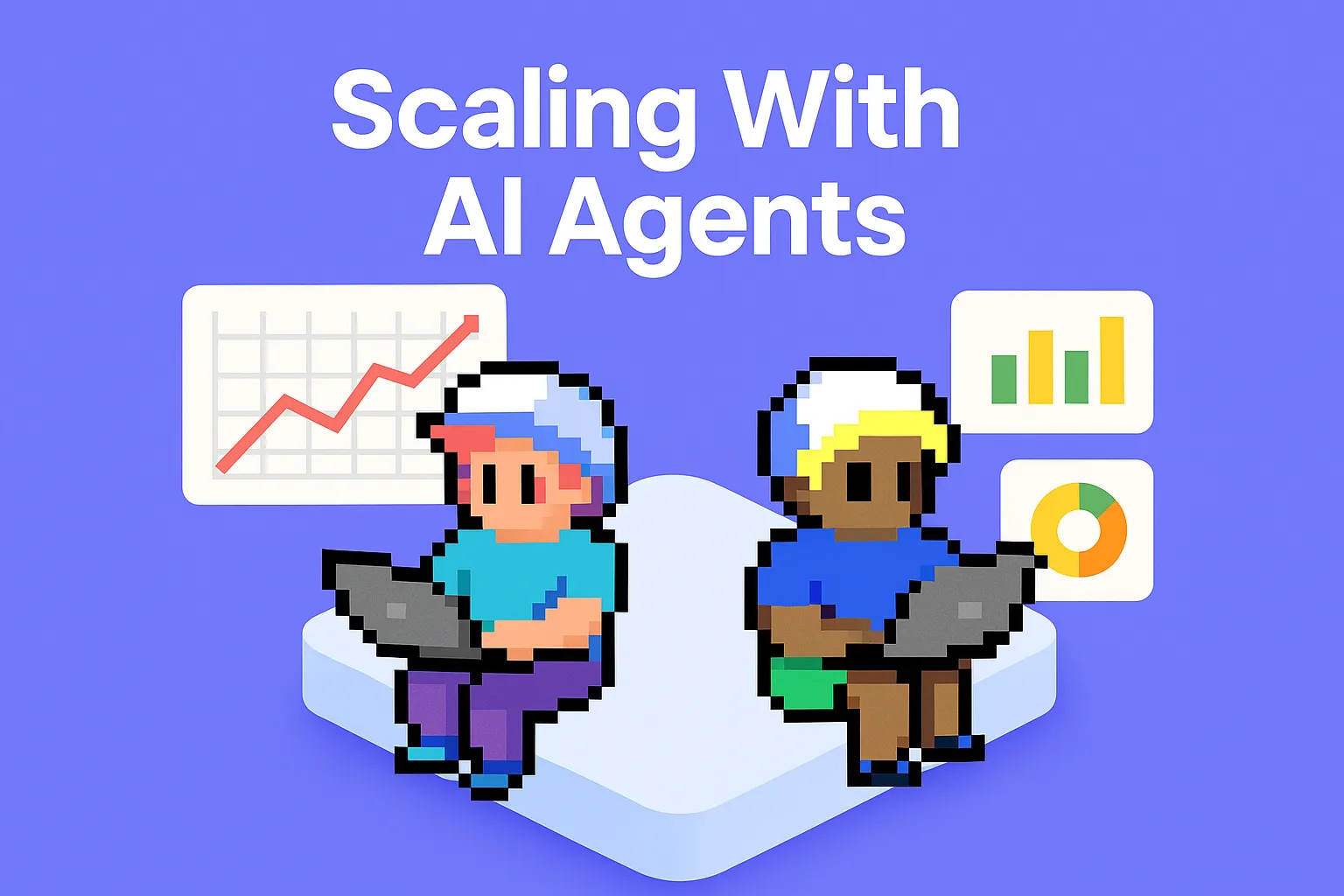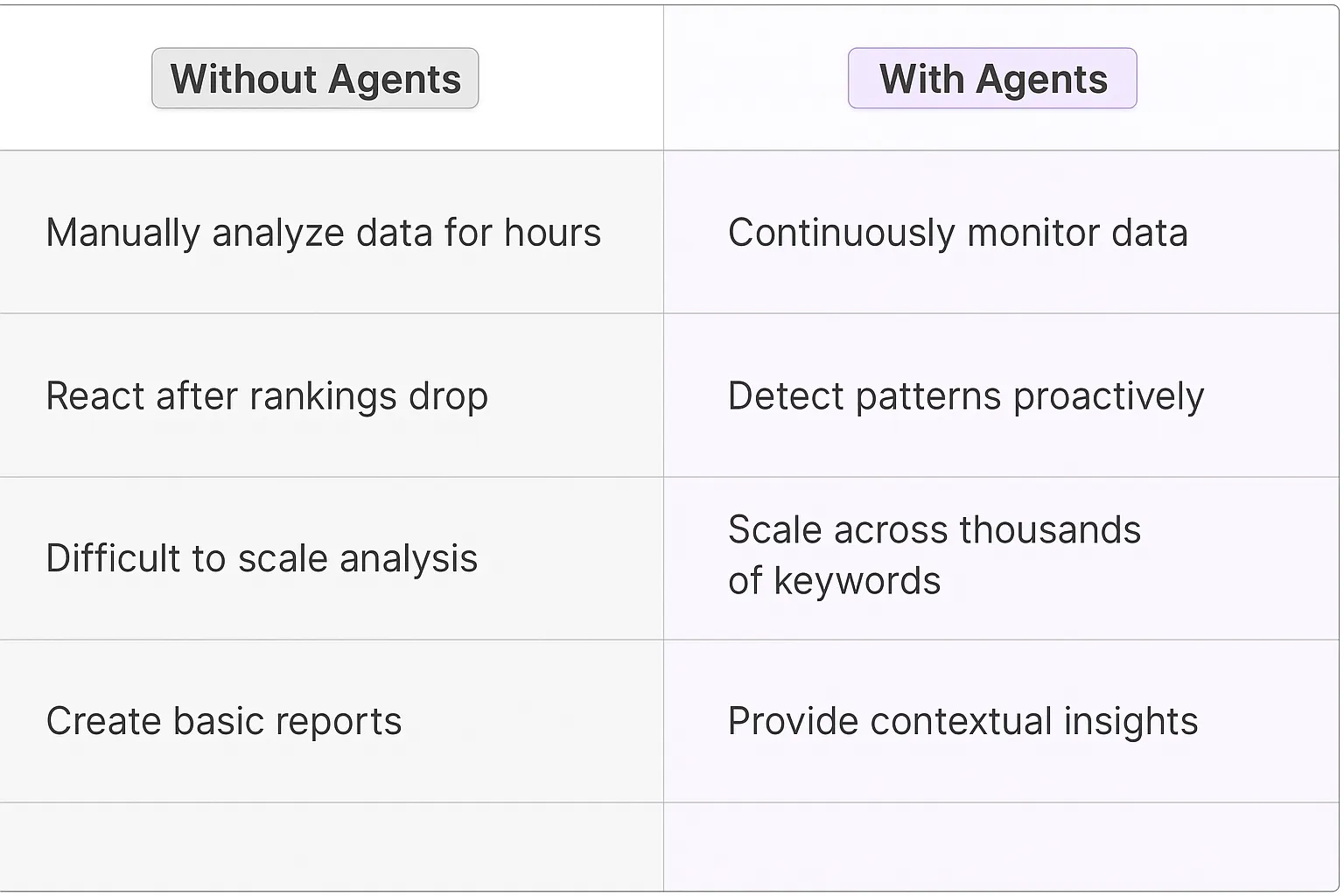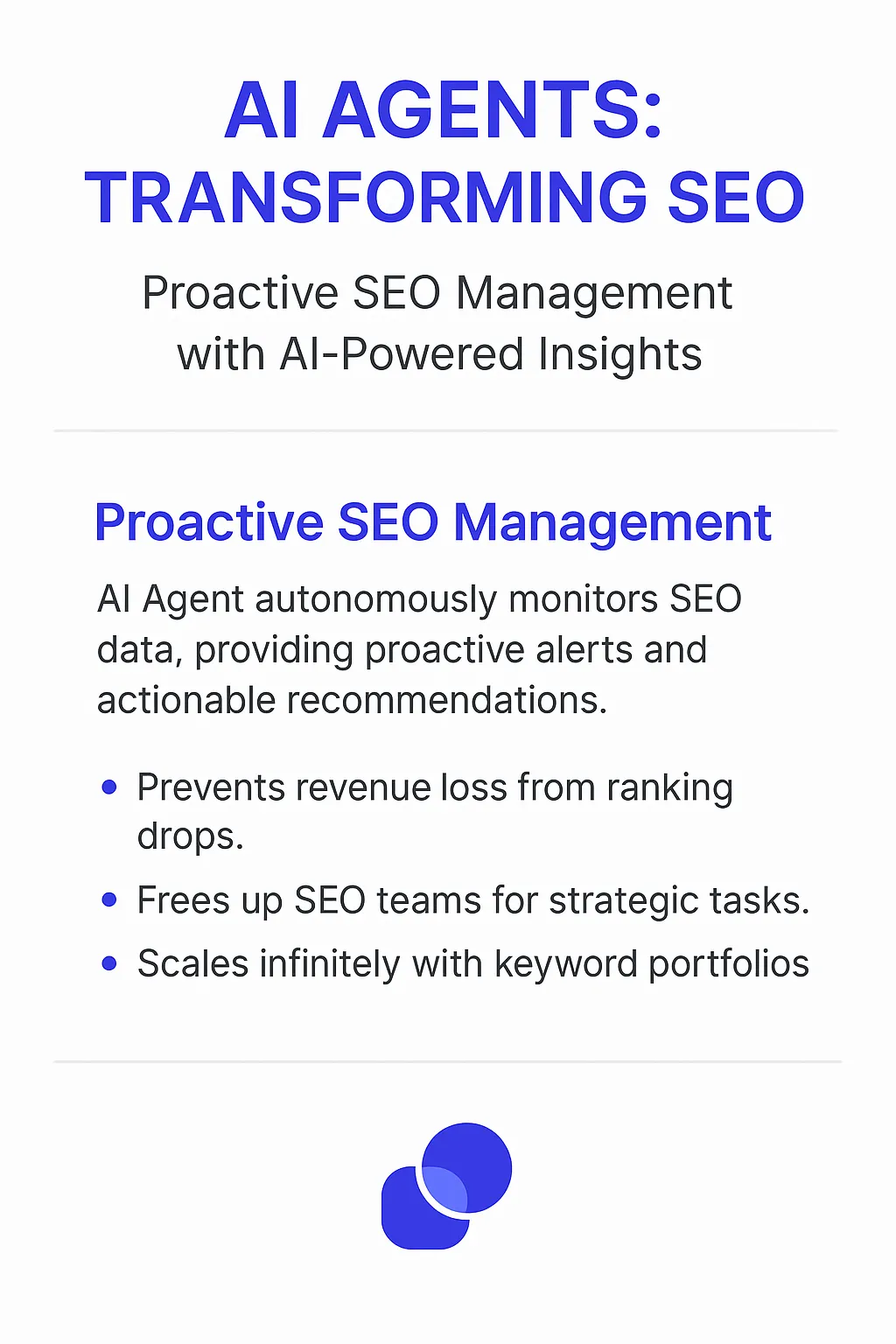AccuRanker
Understanding AccuRanker's Professional SEO Platform
AccuRanker stands as a professional-grade rank tracking platform that delivers precise, real-time keyword position monitoring across search engines. The platform excels at providing granular ranking data for SEO professionals who need accurate, reliable insights into their search visibility. Unlike basic tracking tools, AccuRanker offers enterprise-level capabilities including location-specific monitoring, competitor tracking, and comprehensive SERP feature analysis.
The platform's core strengths include daily rank tracking with on-demand updates, advanced competitor monitoring, and detailed SERP analysis. Users gain access to historical ranking data, custom reporting tools, and API integration capabilities. AccuRanker's sophisticated tracking system monitors rankings across multiple search engines, locations, and devices while maintaining exceptional accuracy.

Benefits of AI Agents for AccuRanker
What would have been used before AI Agents?
SEO teams traditionally relied on manual data analysis and interpretation of AccuRanker's keyword tracking results. This meant spending hours sifting through ranking data, creating reports, and trying to identify meaningful patterns across thousands of keywords. Marketing analysts would need to export data into spreadsheets, create pivot tables, and manually spot ranking changes that required attention.
What are the benefits of AI Agents?
AI Agents transform how teams interact with AccuRanker's ranking data through intelligent automation and pattern recognition. These digital teammates continuously monitor keyword performance, detecting subtle shifts and emerging trends that humans might miss.
The most impactful benefit is the shift from reactive to proactive SEO management. Rather than discovering ranking drops after they've already impacted traffic, AI Agents alert teams to early warning signs like keyword volatility or competitor movements. This early detection system gives SEO managers crucial lead time to implement defensive strategies.
Data interpretation becomes significantly more sophisticated with AI Agents analyzing AccuRanker data. They can identify correlations between ranking changes across different keyword clusters, spot seasonal patterns, and highlight which content optimizations are driving the strongest ranking improvements. This deep analysis would take human analysts days or weeks to complete manually.
The automation of routine tasks like report generation and data aggregation frees up SEO teams to focus on strategic work. Instead of spending Monday mornings preparing weekly ranking reports, teams can dive straight into implementing improvements based on AI-generated insights.
AI Agents also excel at providing contextual recommendations. When they detect ranking changes, they can immediately surface relevant historical data, competitor movements, and potential causative factors - giving SEO managers the full picture needed to make informed decisions.
For enterprise teams managing thousands of keywords, AI Agents serve as an always-on monitoring system that scales infinitely. They can simultaneously track changes across multiple markets, languages, and search engines while maintaining consistent accuracy and attention to detail.

Potential Use Cases of AI Agents with AccuRanker
AccuRanker's powerful rank tracking capabilities combined with AI agents create new possibilities for SEO professionals and digital marketers. These digital teammates enhance keyword research, competitor analysis, and search visibility optimization.
Processes
AI agents transform how teams interact with AccuRanker's ranking data through:
- Automated daily rank tracking reports that highlight significant position changes and emerging trends
- Real-time competitive intelligence gathering by monitoring competitor keyword movements
- Dynamic SERP feature tracking to identify rich snippet and featured snippet opportunities
- Cross-referencing ranking changes with Google algorithm updates to spot correlations
- Proactive alerts when rankings drop below specified thresholds requiring immediate action
Tasks
The granular capabilities of AI agents within AccuRanker enable:
- Instant keyword performance analysis across specific date ranges and locations
- Generation of custom reports combining ranking data with traffic and conversion metrics
- Identification of keyword cannibalization issues across website pages
- Tracking of ranking distributions and average positions for keyword groups
- Analysis of ranking volatility patterns to determine unstable vs stable positions
- Creation of competitor comparison matrices showing ranking gaps and opportunities
- Monitoring of local SEO performance across multiple geographic locations
Strategic Applications
Beyond tactical execution, AI agents elevate AccuRanker's strategic value through:
- Predictive analytics to forecast ranking trends and seasonal variations
- Natural language insights explaining ranking changes in business context
- Integration of ranking data with other SEO tools for comprehensive analysis
- Automated prioritization of optimization opportunities based on potential impact
- Custom alerts for industry-specific ranking events requiring strategic shifts
The combination of AccuRanker's precise rank tracking and AI-powered analysis gives SEO teams an edge in understanding and improving their search visibility. This partnership between human expertise and machine learning capabilities leads to more informed decisions and better organic search outcomes.

Industry Use Cases
AI agents integrated with AccuRanker transform how businesses approach SEO and keyword tracking across multiple sectors. The technology's ability to process vast amounts of ranking data and extract actionable insights creates distinct advantages for different types of organizations. From enterprise-level companies managing thousands of keywords to boutique agencies handling multiple client portfolios, these digital teammates adapt to specific industry requirements and deliver targeted value.
The real power lies in how these AI agents interpret AccuRanker's detailed keyword data and translate it into industry-specific strategies. They don't just track rankings — they identify patterns, flag competitive movements, and surface opportunities that might otherwise go unnoticed. For marketing teams, this means spending less time manually analyzing data and more time executing high-impact SEO initiatives.
What makes these use cases particularly compelling is how the AI agents handle the nuanced differences between industries. A retail business might need to track thousands of product-specific keywords across multiple locations, while a B2B software company might focus on monitoring high-value industry terms across different languages and markets. The AI adapts its analysis and recommendations accordingly, providing relevant insights for each unique business context.
Digital Marketing Agencies: Scaling SEO Operations with AccuRanker AI
Digital marketing agencies face a constant challenge: delivering precise SEO insights across dozens or hundreds of client accounts while maintaining quality and speed. The traditional approach of manually analyzing keyword rankings, spotting trends, and crafting recommendations simply doesn't scale.
AccuRanker's AI capabilities transform how agencies handle large-scale SEO operations. When integrated into daily workflows, the AI analyzes ranking fluctuations across entire client portfolios, detecting patterns human analysts might miss. For example, when Google rolls out an algorithm update, the AI can immediately identify which clients are impacted and by how much, enabling rapid response.
The real power emerges in competitive analysis. Rather than spending hours comparing ranking positions, the AI continuously monitors competitor movements across thousands of keywords. It flags significant shifts - like when a competitor suddenly gains traction for high-value terms - and provides contextual insights about what might be driving those changes.
For agency SEO managers, this creates a multiplier effect. Instead of getting bogged down in data analysis, they can focus on strategic decisions and client communication. The AI handles the heavy lifting of data processing, surfaces the most important insights, and generates clear explanations that can be shared directly with clients.
This shift fundamentally changes the economics of running an SEO agency. Teams can handle 3-4x more clients without sacrificing quality, while delivering faster, more accurate insights. The AI becomes a force multiplier for human expertise rather than replacing it.
E-commerce: Unlocking Search Visibility at Scale with AccuRanker AI
E-commerce businesses operate in an environment where search rankings directly impact revenue. With thousands of SKUs and constantly shifting search landscapes, maintaining visibility requires processing massive amounts of ranking data. This is where AccuRanker's AI creates asymmetric advantages.
The AI's core strength lies in its ability to process product ranking data at scale while extracting actionable patterns. When an online retailer loads their product catalog, the system automatically groups similar items and tracks their collective ranking performance. This reveals which product categories are underperforming in search and need immediate attention.
A key differentiator emerges in seasonal trend analysis. The AI learns from historical ranking patterns to predict upcoming seasonal shifts. For example, it can detect early signals that competitors are starting to optimize for "holiday gift guides" or "back to school" terms, giving merchants time to adjust their SEO strategy proactively rather than reactively.
The system's pattern recognition capabilities extend to product page optimization. By analyzing thousands of successful product listings across different categories, the AI identifies specific content elements that correlate with higher rankings. This creates a feedback loop where each new product listing benefits from aggregate learning across the entire catalog.
For e-commerce SEO teams, this transforms daily operations. Rather than manually reviewing rankings reports, they receive targeted alerts about emerging opportunities and risks. The AI flags specific products that are losing ground to competitors, along with detailed context about potential causes - whether it's content gaps, technical issues, or broader algorithm changes affecting that product category.
This intelligence layer fundamentally changes how online retailers approach search optimization. Teams shift from reactive rank tracking to proactive opportunity capture, using AI-driven insights to stay ahead of market shifts and competitor moves.
Considerations and Challenges
Implementing AccuRanker AI agents requires careful planning and awareness of several key factors that can impact success. The integration process presents both technical and operational hurdles that teams need to navigate.
Technical Challenges
Data quality stands as a primary technical consideration. AccuRanker AI agents rely heavily on clean, well-structured SEO and keyword data to deliver accurate insights. Organizations often struggle with inconsistent data formats, missing historical rankings, or incomplete competitor information that can hamper the AI's performance.
API rate limits pose another technical barrier. When scaling up AI agent usage across multiple projects or large keyword sets, teams may hit AccuRanker's API thresholds. This requires thoughtful architecture decisions around data polling frequencies and optimization of API calls.
Integration complexity with existing SEO tools and workflows can also create friction. Teams need to carefully map out how the AI agent will interact with current rank tracking systems, reporting tools, and analytics platforms to avoid data silos or conflicting information.
Operational Challenges
Team adoption often emerges as a significant operational hurdle. SEO professionals and content teams may resist shifting their established workflows to accommodate AI-driven insights. Creating clear processes for incorporating AI recommendations into content strategy and optimization efforts becomes essential.
Cost management requires ongoing attention. As keyword tracking scales up and AI usage increases, organizations need to balance the expanded capabilities against budget constraints. This includes monitoring API usage, optimizing keyword sets, and measuring ROI from AI-driven optimizations.
Training and documentation demands increase with AI implementation. Teams need resources to understand how to interpret AI insights, troubleshoot common issues, and maintain consistent processes across different users and projects. Building this knowledge base takes time and dedicated effort.
Setting realistic expectations around AI capabilities presents another challenge. While AccuRanker's AI can provide valuable insights, it cannot replace human judgment in SEO strategy. Teams need to understand the AI's limitations and develop frameworks for combining machine intelligence with human expertise.
AI-Enhanced Rank Tracking: The Future of SEO Management
The fusion of AccuRanker's rank tracking precision with AI capabilities represents a fundamental shift in SEO management. Organizations leveraging this combination gain unprecedented ability to detect patterns, predict trends, and respond to ranking changes before they impact business outcomes. While implementation challenges exist, the potential for enhanced SEO performance through AI-augmented rank tracking makes this integration increasingly valuable for modern digital marketing teams. Success lies in thoughtful implementation, clear processes, and balanced use of both AI insights and human expertise.













